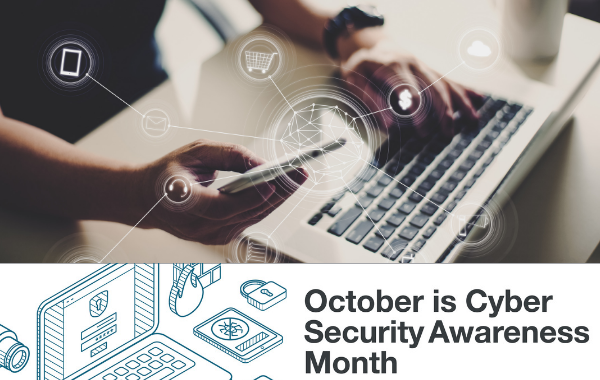Article Reposted; Original Source: https://blog.central-insurance.com/2019/10/10/cyber-security-awareness-be-aware/

Now that it is National Cyber Security Awareness Month, what better time to educate yourself on the current levels of cybercrime around the world. More than half of mid-market businesses have experienced a data breach[1], and more than 175 million individuals become victims of cybercrime annually[2]. In fact, cybercrime is growing so rapidly it is projected to cost the world $6 trillion annually by 2021, representing “the greatest transfer of economic wealth in history,” and becoming “more profitable than the global trade of all major illegal drugs.[3]”
Cybercrime affects individuals, families, and businesses.
Cybercriminals seek out vulnerabilities in our computer networks and online behaviors. Hackers and identity thieves spare no person or business. Particularly vulnerable groups include minor children, college students, senior citizens, natural disaster victims, and small businesses.
What are the most common cyber risks for individuals and families?
As the average person spends more time online, both individuals and families encounter many new cyber risks, from identity fraud to dangerous doxing and cyberbullying. Identity thieves can gather personal information from social media and cyberstalking, as well as phishing e-mails and fake websites to help them impersonate you and/or take over financial accounts.
Other online threats can be both physical and emotional. Doxing—or publishing a person’s physical location and contact information—can result in reputational harm and even threats of physical confrontation. Cyberbullying causes emotional dismay and reputational damage. On dating websites fake profiles get created to “catfish” victims—sometimes for the perpetrator’s personal fun but other times for more nefarious purposes. Finally, cyberstalking can lead to very real—and dangerous—physical stalking behaviors.
What are the most common cyber risks for businesses?
Modern companies run on information technology. Data about customers, employees, sales orders, operations, research and development, and financials are the beating heart of any business. Between cloud software, the Internet of Things, and e-commerce, more business information gets exchanged online than ever before.
The greatest cyber threats to businesses are the theft of company data through a data breach and the disabling of IT networks by ransomware. Many times, cybercriminals gain the information or credentials they need to attack business networks by sending phishing e-mails to employees or executives. These e-mails can look very authentic and appear to come from people inside your company. Cybercriminals spend time researching organizations in order to use social engineering to fool their targets into opening the phishing e-mail.
Own IT. Secure IT. Protect IT.
This year, the theme of National Cyber Security Awareness Month is “Own IT, Secure IT, Protect IT.” Hackers are always at work—they never rest. There is no time to wait. Take action now to secure and protect your personal identity and business data.
OWN your IT and personal information by educating yourself about cyber threats.
- DON’T OVERSHARE personal or financial information on social media platforms.
- BE SELECTIVE about who you connect with on social platforms or dating websites.
- REVIEW PRIVACY SETTINGS for social media and other applications.
SECURE IT changing your online habits to enhance your cyber defenses.
- STRENGTHEN PASSWORDS on computers, devices, and websites and change them regularly.
- AVOID PHISHING e-mails and don’t click on links from people you don’t know or e-mails that don’t seem legit. When in doubt, telephone the recipient and ask.
- TURN ON MULTI-FACTOR AUTHENTICATION to make your logins more secure, especially on any website where you do online banking, bill payment, or shopping.
- SHOP SAFELY by making online purchases only from well-known stores and brands and always looking for the https:// in the URL before entering payment information.
PROTECT IT by implementing solutions and services that can increase cybersecurity and monitor against suspicious events.
- INSTALL SECURITY SOFTWARE including anti-virus and anti-malware to protect personal and business computers.
- UPDATE SYSTEMS to ensure your web browser and operating system have the latest security updates.
- IDENTITY AND CREDIT MONITORING services watch for unusual activity 24/7/365, alerting you to any trouble.
- BACK-UP DATA regularly to protect yourself and your business from hard drive/server failures and ransomware.
Another way to protect yourself is to invest in cyber insurance. Many insurance companies offer solutions for both businesses and personal protection. Contact your independent agent to learn more about these coverages and how they can protect you, your family, and your business from the effects of cybercrime.
Content provided by CyberScout.
[1] “Small and Mighty—CyberSecurity Special Report,” Cisco, July 2018.
[2] “Norton Cyber Security Insights Report Global Results,” Symantec, 2017.
[3] “2019 Official Annual Cybercrime Report,” Cybersecurity Ventures
© 2019 CyberScout Breach Resources. All rights reserved.
